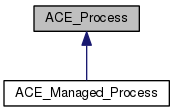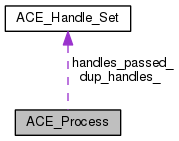|
ACE
6.1.0
|
|
ACE
6.1.0
|
Process. More...
#include <Process.h>


Public Member Functions | |
| ACE_Process (void) | |
| Default construction. Must use <ACE_Process::spawn> to start. | |
| virtual | ~ACE_Process (void) |
| Destructor. | |
| virtual int | prepare (ACE_Process_Options &options) |
| virtual pid_t | spawn (ACE_Process_Options &options) |
| virtual void | parent (pid_t child) |
| virtual void | child (pid_t parent) |
| virtual void | unmanage (void) |
| pid_t | wait (ACE_exitcode *status=0, int wait_options=0) |
| pid_t | wait (const ACE_Time_Value &tv, ACE_exitcode *status=0) |
| int | kill (int signum=SIGINT) |
| int | terminate (void) |
| pid_t | getpid (void) const |
| Return the process id of the new child process. | |
| ACE_HANDLE | gethandle (void) const |
| Return the handle of the process, if it has one. | |
| int | running (void) const |
| Return 1 if running; 0 otherwise. | |
| ACE_exitcode | exit_code (void) const |
| int | return_value (void) const |
| void | close_dup_handles (void) |
| void | close_passed_handles (void) |
| PROCESS_INFORMATION | process_info (void) |
Protected Member Functions | |
| void | exit_code (ACE_exitcode code) |
Protected Attributes | |
| PROCESS_INFORMATION | process_info_ |
| ACE_exitcode | exit_code_ |
| ACE_Handle_Set | handles_passed_ |
| Set of handles that were passed to the child process. | |
| ACE_Handle_Set | dup_handles_ |
| Handle duplicates made for the child process. | |
Private Member Functions | |
| ACE_Process (const ACE_Process &) | |
| void | operator= (const ACE_Process &) |
| wchar_t * | convert_env_buffer (const char *env) const |
Friends | |
| class | ACE_Process_Manager |
Process.
A Portable encapsulation for creating new processes. Notice that on UNIX platforms, if the <setenv> is used, the <spawn> is using the <execve> system call. It means that the <command_line> should include a full path to the program file (<execve> does not search the PATH). If <setenv> is not used then, the <spawn> is using the <execvp> which searches for the program file in the PATH variable.
| ACE_Process::ACE_Process | ( | void | ) |
Default construction. Must use <ACE_Process::spawn> to start.
| ACE_Process::~ACE_Process | ( | void | ) | [virtual] |
Destructor.
| ACE_Process::ACE_Process | ( | const ACE_Process & | ) | [private] |
| void ACE_Process::child | ( | pid_t | parent | ) | [virtual] |
Called just after <ACE_OS::fork> in the child's context. The default does nothing. This function is *not* called on Win32 because the process-creation scheme does not allow it.
| void ACE_Process::close_dup_handles | ( | void | ) |
Close all the handles in the set obtained from the
| void ACE_Process::close_passed_handles | ( | void | ) |
Close all the handles in the set obtained from the
| wchar_t * ACE_Process::convert_env_buffer | ( | const char * | env | ) | const [private] |
| ACE_exitcode ACE_Process::exit_code | ( | void | ) | const [inline] |
Return the Process' exit code. This method returns the raw exit status returned from system APIs (such as <wait> or <waitpid>). This value is system dependent.
| void ACE_Process::exit_code | ( | ACE_exitcode | code | ) | [inline, protected] |
Set this process' <exit_code_>. ACE_Process_Manager uses this method to set the <exit_code_> after successfully waiting for this process to exit.
| ACE_HANDLE ACE_Process::gethandle | ( | void | ) | const [inline] |
Return the handle of the process, if it has one.
| pid_t ACE_Process::getpid | ( | void | ) | const [inline] |
Return the process id of the new child process.
| int ACE_Process::kill | ( | int | signum = SIGINT | ) | [inline] |
Send the process a signal. This is only portable to operating systems that support signals, such as UNIX/POSIX.
| void ACE_Process::operator= | ( | const ACE_Process & | ) | [private] |
| void ACE_Process::parent | ( | pid_t | child | ) | [virtual] |
Called just after <ACE_OS::fork> in the parent's context, if the <fork> succeeds. The default is to do nothing.
| int ACE_Process::prepare | ( | ACE_Process_Options & | options | ) | [virtual] |
Called just before <ACE_OS::fork> in the <spawn>. If this returns non-zero, the <spawn> is aborted (and returns ACE_INVALID_PID). The default simply returns zero.
| PROCESS_INFORMATION ACE_Process::process_info | ( | void | ) | [inline] |
| int ACE_Process::return_value | ( | void | ) | const [inline] |
Return the Process' return value. This method returns the actual return value that a child process returns or <exit>s.
| int ACE_Process::running | ( | void | ) | const |
Return 1 if running; 0 otherwise.
| pid_t ACE_Process::spawn | ( | ACE_Process_Options & | options | ) | [virtual] |
Launch a new process as described by options. On success, returns 1 if the option avoid_zombies is set, else returns the process id of the newly spawned child. Returns -1 on failure. This will be fixed in the future versions of ACE when the process id of the child will be returned regardless of the option.
| int ACE_Process::terminate | ( | void | ) | [inline] |
Terminate the process abruptly using ACE::terminate_process(). This call doesn't give the process a chance to cleanup, so use it with caution...
| void ACE_Process::unmanage | ( | void | ) | [virtual] |
Called by a Process_Manager that is removing this Process from its table of managed Processes. Default is to do nothing.
Reimplemented in ACE_Managed_Process.
| pid_t ACE_Process::wait | ( | ACE_exitcode * | status = 0, |
| int | wait_options = 0 |
||
| ) | [inline] |
Wait for the process we've created to exit. If status != 0, it points to an integer where the function store the exit status of child process to. If wait_options == WNOHANG then return 0 and don't block if the child process hasn't exited yet. A return value of -1 represents the <wait> operation failed, otherwise, the child process id is returned.
| pid_t ACE_Process::wait | ( | const ACE_Time_Value & | tv, |
| ACE_exitcode * | status = 0 |
||
| ) |
Timed wait for the process we've created to exit. A return value of -1 indicates that the something failed; 0 indicates that a timeout occurred. Otherwise, the child's process id is returned. If status != 0, it points to an integer where the function stores the child's exit status.
friend class ACE_Process_Manager [friend] |
ACE_Handle_Set ACE_Process::dup_handles_ [protected] |
Handle duplicates made for the child process.
ACE_exitcode ACE_Process::exit_code_ [protected] |
ACE_Handle_Set ACE_Process::handles_passed_ [protected] |
Set of handles that were passed to the child process.
PROCESS_INFORMATION ACE_Process::process_info_ [protected] |
 1.7.5.1
1.7.5.1